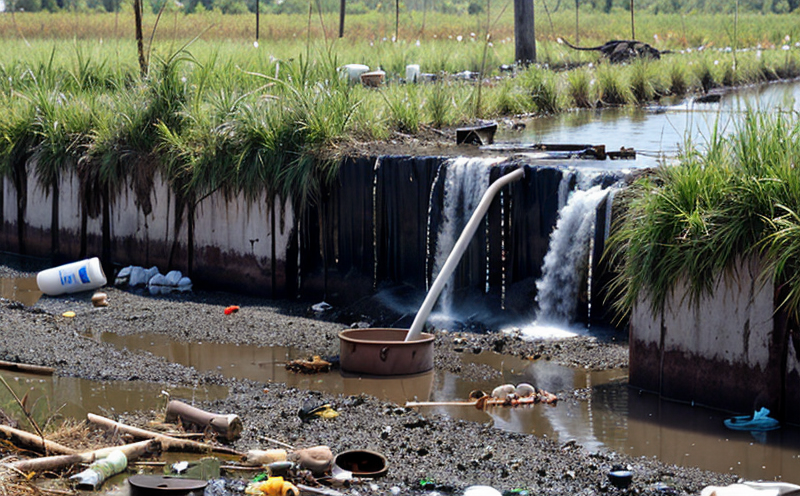Beer Pollutant Testing
The environmental quality of our water resources is a critical factor in determining the health and sustainability of ecosystems. As global concerns over pollution continue to grow, so does the need for reliable testing methods that can accurately identify pollutants present in various environments, including beer production processes.
Beer Pollutant Testing involves evaluating the presence and concentration levels of harmful substances within beer products. This service ensures compliance with international standards and regulations aimed at safeguarding public health while promoting sustainable practices throughout the beverage industry. By providing detailed analytical data on potential contaminants such as heavy metals, pesticides, microplastics, and other hazardous materials, this testing helps breweries maintain a high standard of product quality.
Our laboratory employs state-of-the-art equipment and adheres strictly to ISO/IEC 17025 accreditation requirements to deliver accurate results consistently. The team consists of experienced chemists specializing in environmental pollutants who work closely with clients to understand their unique needs and develop tailored solutions for each project.
The process begins with thorough sample collection from different stages of the beer-making cycle, ensuring that every batch undergoes rigorous analysis under controlled conditions. Once collected, samples are analyzed using advanced techniques like ICP-MS (Inductively Coupled Plasma Mass Spectrometry), GCxGC-TOSQMS (Gas Chromatography x Gas Chromatography Time-of-Flight Mass Spectrometry), and FTIR (Fourier Transform Infrared spectroscopy). These methods allow us to detect even trace amounts of pollutants, providing precise measurements that are crucial for identifying any potential issues early on.
After completing all necessary analyses, our expert team provides comprehensive reports detailing findings along with recommendations for corrective actions if required. This information is invaluable for maintaining compliance with local and international standards such as EU Directive 2006/113/EU concerning the availability of safe drinking water and ISO/TR 18925 on Good Laboratory Practice (GLP).
By leveraging our expertise in Beer Pollutant Testing, businesses can ensure they meet regulatory requirements and protect both their reputation and consumers' well-being. Our services play a vital role in fostering trust between manufacturers and end-users by offering transparent insights into the safety and quality of beer products.
Applied Standards
The International Organization for Standardization (ISO) sets forth numerous guidelines related to food safety, including ISO 17025 accreditation for our laboratory. Additionally, European Union directives like Directive 2006/113/EU on the availability of safe drinking water provide essential frameworks governing the testing procedures used during Beer Pollutant Testing.
For more specific applications within brewing operations, industry standards such as ISO/TR 18925 emphasize adherence to Good Laboratory Practice (GLP), ensuring that all tests conducted are accurate and reproducible. Furthermore, American Society for Testing and Materials (ASTM) E1739 offers recommendations on how to conduct microplastic analysis in foodstuffs, which can be applied directly to beer samples.
By aligning ourselves with these recognized bodies and their associated protocols, we ensure that our clients receive reliable results backed by robust scientific principles. This approach not only enhances confidence among stakeholders but also supports broader efforts towards environmental protection and responsible resource management within the beverage sector.
Environmental and Sustainability Contributions
The importance of Beer Pollutant Testing cannot be overstated when considering its role in promoting sustainability and preserving natural resources. By identifying pollutants early on, businesses can take proactive measures to minimize their environmental footprint while maintaining product quality.
Our testing services contribute significantly to reducing waste by helping manufacturers identify sources of contamination before they become severe problems. This allows for targeted interventions aimed at preventing further degradation of aquatic ecosystems and protecting human health. For instance, if heavy metal traces are detected in certain batches, corrective actions can be implemented immediately to avoid larger-scale issues down the line.
Moreover, by adhering to stringent testing protocols, we encourage responsible sourcing practices that respect local communities and promote fair trade principles. Our work supports efforts to reduce pollution levels globally and contribute positively to global sustainability goals outlined in frameworks like the United Nations Sustainable Development Goals (SDGs).
Competitive Advantage and Market Impact
In today's competitive market, maintaining a reputation for delivering high-quality products is essential. By incorporating Beer Pollutant Testing into their quality assurance processes, companies gain several key advantages:
- Enhanced Consumer Trust: Reliable testing ensures that consumers have peace of mind knowing they are consuming safe and uncontaminated beverages.
- Compliance with Regulations: Staying ahead of regulatory changes helps maintain compliance and avoid costly penalties associated with non-compliance.
- Innovation Opportunities: Insights gained from pollutant analysis can lead to innovations in brewing techniques or ingredient selection, giving businesses a competitive edge.
- Cost Efficiency: Early detection of issues leads to more efficient problem-solving and reduced costs linked to recalls or product withdrawals.
The ability to demonstrate commitment to sustainability through rigorous testing also enhances brand image among eco-conscious consumers. As environmental awareness continues to rise, businesses that prioritize these practices are likely to see increased market share and customer loyalty.





